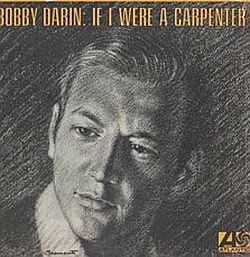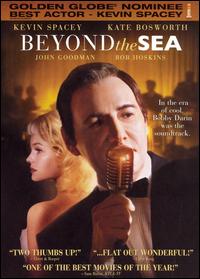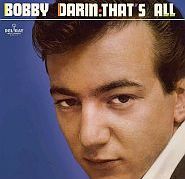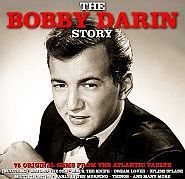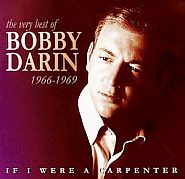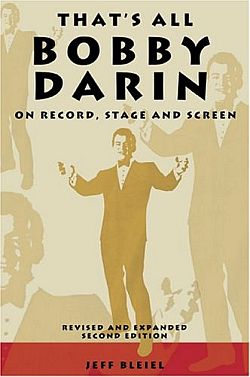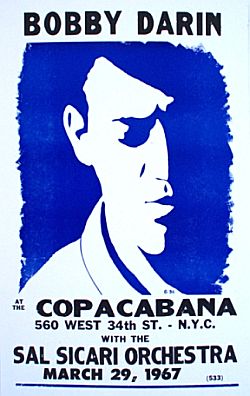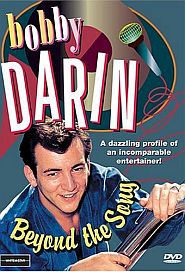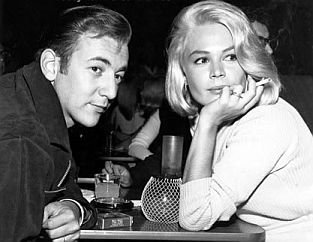
Bobby Darin & wife Sandra Dee in the 1960s.
That career lasted a short 15 years, ending in Darin’s premature death at the age of 37. But for a time, Bobby Darin set the entertainment world on fire, reaping fame, fortune and also a share of criticism.
He rose quickly on the pop music charts with his million-selling rock ‘n roll songs, then became a successful Las Vegas headliner and nightclub entertainer. Hollywood came next with acting, singing, film-score writing, and a movie-star wife. Yet along the way, Darin pushed hard and made brash claims, grating against many he met; but he also impressed with genuine talent.
Bobby Darin knew he would have a short life, so he grabbed what he could. He also found time for politics and social protest. Darin was swept up by the promise of Robert F. Kennedy’s presidential bid in 1968. He jumped into that campaign big, and like others, fell hard when Kennedy was assassinated.
Life for Darin, too, ran out much too soon. He died on the operating table in 1973 with a failing heart. Today, his legacy is the music he left behind, but also a unique lifetime lived amid talent and peril.
Bronx Born
Bobby Darin was born Walden Robert Cassotto in May 1936. He was raised in a mixed neighborhood of mostly Italian and Irish immigrants in New York’s South Bronx along East 135th Street. As a child, he fought rheumatic fever which damaged his heart and plagued him throughout his life. Doctors told his family — which he overheard — that it would be a miracle if he lived past his teens.
As a kid growing up, he was often ill. “My earliest recollections were of being in bed, stiff, hurting,” he recalled. “I used to read or do coloring books. I couldn’t do what everybody else was doing.” Still, he made his way, graduated from the Bronx High School of Science. At 17, he enrolled at Hunter College as a theater major, landed a lead role in one play, but left Hunter after one year.
He then became a demo writer and singer at the famed music bee hive that was the Brill Building in 1950s New York. By 1957, Darin recorded a song or two, but to no great notice. He then had a one-year contract with Atco Records that was about to expire. In December of that year, he appeared on Dick Clark’s American Bandstand performing “Don’t Call My Name.” But in 1958 he struck gold somewhat by chance.
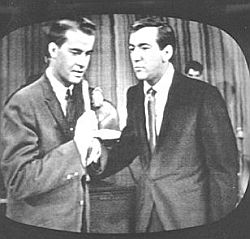
Screen shot from "American Bandstand" TV show with Dick Clark, left, and guest Bobby Darin, possibly late 1950s. Click for Bandstand story.
Darin didn’t think much of it at the time, but later he started playing with it at the piano, more lyrics came and he took a finished tune (with co-author credit to Jean Kaufman) over to his record label, Atco. Although there was some division at Atco over whether the tune would work, they went with it. It was recorded in April 1958. They titled it “Splish, Splash.”
Although certainly not one of the most cerebral works of the time, its quirkiness caught on. It was released in June 1958 and soon became a No.1 pop hit. It sold a million copies. Two more singles quickly followed. “Queen of the Hop” was released in early 1959 and rose to No.9 on the charts. It sold another million copies.

Record sleeve for 1959 single, 'Dream Lover,' which became a million seller. Click for digital single.
Music Player
“Dream Lover”-1959
“Dream Lover” became his third million seller. Darin was now at the apex of his “teen idol” phase. But even though he was riding high on the pop charts, Darin had something else in mind. In fact, he had already used some of the money made from his first hits to record an album of standards entitled That’s All. Released in March 1959, that album included the song “Mack the Knife,” which was also later released as a single.
Mack The Knife
Originally, “The Ballad of Mack the Knife” (composed by Kurt Weill with lyrics by Bertolt Brecht) was written for a1928 German stage drama, known in English as The Threepenny Opera, a story about a rogue and criminal named Macheath. That story opens with a singer comparing Macheath with a shark, telling tales of his dark deeds — robberies, murders, arson and rape. An English translation of the play and the song were later made in 1954, running off Broadway and elsewhere.The single “Mack the Knife” sold more than 2 million copies by 1961. Before Darin made his recording of the song, Louis Armstrong had made the first American version in 1956. Darin had gone to a theater in Greenwich Village to see a revival of The Threepenny Opera where he heard “Mack The Knife” in the show. When Darin first proposed making his own version of the song, some of his advisors and friends thought it a bad idea. Dick Clark, then popular host of the American Bandstand TV show, had become a friend of Darin’s. Clark advised Darin not to record the song because of the perception that, having come from an opera, it wouldn’t appeal to the rock and roll audience. Others agreed. Yet Darin, then 23, liked the song’s offbeat jazzy tempo. The song’s structure allowed for versatility and interpretation, and for Darin, it became a good vehicle for his talents. He recorded it in New York in December 1958. Ahmet Ertegun of Atlantic Records recalled, “We knew as we were cutting it. We were jumping up and down. After the first take, I said, ‘You’ve got it! That’s it!'” It was released as a single in August 1959. By October 5th,1959, “Mack the Knife” rose to No.1 on the national Billboard chart and remained in that position for 9 weeks.
“Mack the Knife” became one of Darin’s signature songs. It would win him a Record-of-the-Year Grammy award for 1959. More than 40 years later, Rolling Stone would rank his version of the song No.251 on its “500 Greatest Songs of All Time.” Frank Sinatra, who also recorded the song, as did others including Ella Fitzgerald, would later call Darin’s “Mack The Knife” the “definitive” version, a very high compliment.But for Darin in 1958-59, “Mack the Knife” — along with the album That’s All — proved a very deft business move, signaling a turn in style toward more adult audiences and a broader fan base. Darin became the first young singer to bridge the singles and album gap between teenage and adult buyers, selling to both.
By March 1961, he had made six albums that sold more than 1.5 million copies. The single “Mack the Knife” by that time — which had stayed in the Top 40 for 22 weeks — had sold more than 2 million copies. Another successful single in 1960, “Beyond the Sea”, a jazzed-up version of the French hit song “La Mer” by Charles Trenet, rose to No. 6 on the music charts, and also signaled his move into new musical territory.
Las Vegas & Beyond

August 1962 - Darin has top billing at the Flamingo in Vegas. (photo - Don Fasulo)
|
Bobby Darin 1958 Splish, Splash – #1 |
In 1960, Darin had also begun appearing in film – a first role in Pepe, in which he also sang. He was also cast to play a role in the film comedy-romance Come September and was in Italy preparing for scenes to be shot there. It was in Italy where Darin would met his future wife, Sandra Dee, one of Hollywood’s up and coming stars, then 17-18 years old. She was cast to play opposite Darin in the film.
Dee remembers first seeing Darin standing on shore as she was arriving in a boat that was docking nearby. “Will you marry me?,” he called out to her. “Not today,” she replied. Darin continued to ask her again and again, every day. By the time the couple returned to the U.S. after their filming, they announced their engagement and were married on December 1st, 1960. Darin was then also riding high with a string of hit songs, including “Beyond the Sea,” “Clementine,” “Won’t You Come Home Bill Bailey” and “Artificial Flowers”– all in 1960.
Meanwhile, the film Come September was released in August 1961 and had good box office results. Rock Hudson and Gina Lollobrigida were its top stars along with Dee and Darin in his first movie. Other movie roles for Darin followed. In State Fair, a 1962 dramatic musical with Pat Boone, Ann-Margret, Pamela Tiffin, Tom Ewell, and veteran actress Alice Faye, Darin played an ambitious TV reporter who becomes involved with a farm girl played by Tiffin. This film, however, was not successful, although its soundtrack was a best seller. Darin, meanwhile, pushed for more film roles and had also set up his own independent film company, Sandar Productions, to elevate his career. “I want to do drama, light comedy, the whole range,” he said in 1962, adding, “And some day I want an Academy Award.”
Brash & Aggressive
Darin’s brash and aggressive manner, according to some, was related to fears about his health. “My feeling is that he knew he wasn’t going to live long,” explained long-time friend and secretary Harriet Wasser, “[I]t was more important to him to make his statement as an artist than a diplomat.”Known to have alienated the likes of Perry Como while the two prepared for a TV special, and not always accommodating to admiring fans, Darin assured a Saturday Evening Post reporter that he wasn’t like Pat Boone.
“I’ll write no book like Twixt Twelve and Twenty,” he explained, referring to a clean-living best-seller that Boone had then written for teenagers. “I’m here to entertain them. Their morals and their deportment are someone else’s concern. It’s not my business to tell them to go to church or not, to wear a tie or not. . .”
|
Darin in Film Acting/Singing/Songwriting Songs or Score only Director/Producer |
In Hollywood, meanwhile, Darin appeared in four other 1962 films: his first dramatic role in John Cassavetes’ film Too Late Blues; a war drama, Hell Is for Heroes with Steve McQueen, James Coburn, and Fess Parker; Pressure Point, a drama with Sidney Poitier that earned Darin a Golden Globe Award for Most Promising Male Newcomer; and If a Man Answers, a romantic comedy with his wife Sandra Dee in which he also wrote and sang the movie’s love theme over the credits. In the 1963 film, Captain Newman, M.D., with Gregory Peck, Angie Dickinson, and Larry Storch, Darin received an Academy Award nomination for Best Supporting Actor. In 1964, he wrote the score for The Lively Set, and sang the opening theme for the 1965 Disney movie That Darn Cat. He starred again with his wife Sandra Dee in the 1965 film That Funny Feeling, also writing and singing the movie’s theme. Four other films followed in the 1967-1973 period in which he performed or wrote music. A 1970 film, The Vendors, which Darin wrote, directed and produced with actors Richard Bakalayan, Gary Wood, Dick Lord and Mariette Hartley, was never released. All in all, Darin played in 13 films, composed two full movie scores, and five title songs. He also starred in Kraft Music Hall’s television production of Give My Regards to Broadway. Through the 1960s, he also appeared on a number of television shows, among them, The Judy Garland Show (1963) and The Andy Williams Show (1964).
Darin’s musical and nightclub career also continued through his film-making years. But by the mid-1960s, he once again changed musical styles, this time moving into folk-rock. In 1966 he had success with a version of Tim Hardin’s song, “If I Were a Carpenter.” He also wrote a song for Hardin — “A Simple Song of Freedom”– which became a hit for Hardin. And Darin’s version of “Carpenter” also became a Top Ten hit in 1966.
Tough Times
By the late 1960s, however, life’s road for Bobby Darin became quite bumpy. In 1967, he divorced Sandra Dee. The following year, he discovered his supposed mother was actually his grandmother and his presumed sister really his mother — a revelation that rocked Darin and remained troubling to him for the rest of his life. Darin also became actively involved in the 1968 presidential candidacy of Robert Kennedy and believed in Kennedy’s platform. Darin participated in the 1965 civil rights march from Selma to Mont- gomery, Alabama. Darin had been attracted to social justice issues in the 1960s, and was an early supporter of Rev. Dr. Martin Luther King, Jr. Darin participated in the 1965 civil rights march from Selma to Montgomery, Alabama. As a performer, too, Darin helped black artists get on stage in the early 1960s, as he had done in the face of some management resistance at the Copacabana, insisting that Nipsey Russell be his opening act. Later, he would also have Richard Pryor and Flip Wilson as opening acts before they became well known. In Kennedy’s campaign, Darin made appearances on behalf of the candidate and also worked to help Kennedy in the primaries. Kennedy’s assassination in June 1968 had a deep effect on Darin. For a time, he dropped out, quit working, sold some of his possessions, and moved to a mobile home at Big Sur, California. In late August 1968, he sold his music publishing company, T.M. Music, to Commonwealth United Corp. for $1 million. He was also then planning to start his own record label, Direction Records, and began focusing on folk and protest music.
|
“Simple Song Of Freedom” Come and sing a simple song of freedom Hey there, mister black man can you hear me? So come and sing a simple song of freedom… Seven hundred million are ya list’nin’? So come and sing a simple song of freedom… Brother Solzhenitsyn are you busy? Come and sing a simple song of freedom… Now, no doubt some folks enjoy doin’ battle Come and sing a simple song of freedom… . . .We, the people here, don’t want a war. |
In late October 1968, he debuted a new protest song, “Long Line Rider,” at the Cocoanut Grove, changing his dress in mid-show from tuxedo to denim jacket. Two months later, in January 1969, he appeared at New York’s Copacabana with a four-piece rock band performing “Long Line Rider.” A few weeks later, he walked off the TV set of the Jackie Gleason Show after he was prohibited from singing “Long Line Rider.”
(A “long line rider” was a prison guard, often on horseback, who supervised inmates on prison farms and work details in the rural South. Darin’s song highlighted the terror reported at the Arkansas Cummins Prison Farm, where three skeletons of former prisoners were reportedly discovered in January 1968).
In 1969, Darin also wrote and recorded “A Simple Song of Freedom,” a soft, guitar-based anti-war protest song, which he debuted at The Troubadour in Los Angeles that May. Tim Hardin also recorded the song for a hit that year.
Music Player
“Simple Song of Freedom” – 1969
Bobby Darin
Through 1969, Darin continued making club and TV appearances in his new folk style. In Las Vegas at the Sahara club in December 1969, when asked to perform “Mack the Knife,” a classic in his former nightclub routine, he refused.
By 1970, Darin was protesting the Vietnam War, and in May 1970 he took out newspaper ads denouncing the U.S. invasion of Cambodia. Around that same time, he also addressed an anti-war demonstration of mostly University of Southern California students at City Hall in Los Angeles, urging a “phone-in for peace” campaign aimed at the White House.
In early summer 1970, Darin appears to have returned to his old standards, at least partially, putting “Mack the Knife” back into his repertoire at the Landmark nightclub in Las Vegas. He still wore the denims, however, also doing renditions of songs by the rock group Blood, Sweat & Tears such as, “And When I Die” and “Spinning Wheel,” and also Fred Neil’s “Everybody’s Talkin’.” He traveled to London that June and performed there and on return to the states, co-hosted The Mike Douglas Show on TV in July 1970.
Las Vegas: 1970s
In Las Vegas during the early 1970s, Darrin had also become a friend of Jay Tell, who published The Las Vegas Free Press. According to Tell, Darin became a silent partner in the newspaper, which published a range of anti-war and anti-Nixon stories, among others. Darin also considered politics around this time, according to Tell. “I took him to Gov. Grant Sawyer and Supreme Court Justice John Mowbray, long-time Tell family friends, to explore his political viability,” said Tell. “Few knew it, but Bobby was also an authentic genius, a Mensa member, with an IQ of 137, in the top 2 percent.” – Jay Tell “They thought he could possibly be elected mayor, senator or governor.” But nothing appears to have gone beyond the meetings. Tell thought a great deal of Darin, impressed with his sharp mind and interest in world affairs: “Few knew it, but Bobby was also an authentic genius, a Mensa member, with an IQ of 137, in the top 2 percent.” Sandra Dee, although a biased party, called him the brightest person she’d ever known. Musically, Darin could do just about anything having to do with song and dance, and he also played a variety of musical instruments including piano, guitar, vibes, harmonica and drums. He had a great stage presence, a knack for comedy sketches and ad libs, and good natural timing. According to Jay Tell, Darin was also a great impressionist, and could mimic a range of celebrities and movie stars, inlcuding James Cagney, Clark Gable, Tony Bennett, Ray Charles, Jimmy Stewart, Marlon Brando and Cary Grant, among others.
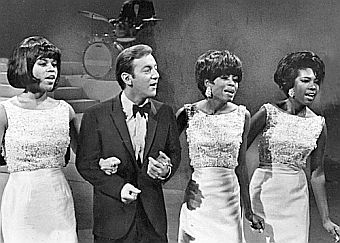
Bobby Darin performing with Motown singing artists, The Supremes, on a 1967 TV show.
. . . Elusive though his style may be — folksy-humble at some points, Vegas-flashy at others –Darin is still a first-class performer. He sang, played the guitar, drums and piano, tied things together with a virtually nonstop and often with witty patter, and managed to pull a lackadaisical first-night audience out of its lethargy.
Still, Darin belongs to another era, despite his eager efforts to keep up-to-date with songs like Tim Hardin’s “If I Were a Carpenter” and his own “Sing A Simple Song of Freedom.” He is clearly most comfortable with the Frank Sinatra-Dean Martin style that was the essence of his first musical incarnation. . . .
Throughout 1972 , Darin did more Vegas performing and television, including his own show — The Bobby Darin Amusement Company — which ran on NBC for seven-weeks that summer. He also performed a concert in New York’s Central Park in July. “It’s a one-time shot, this life, and you don’t get any second chances.”
– Bobby Darin A month later, his first Motown label record album, Bobby Darin, came out, and NBC announced in November that his TV show would return in January 1973. Although The Bobby Darin Show did debut on NBC in late January 1973, by April, after the last of the show had aired, NBC cancelled it. In late June 1973, Darin married Andrea Joy Yeager in California. In July, he began performing at the Las Vegas Hilton, logging what would be his last concerts in August 1973. By then, his weak heart made performing increasingly difficult, resorting to oxygen between acts on some occasions. On December 11th, he entered the Cedars of Lebanon hospital in Los Angeles to repair the artificial heart valves he received in 1971. He died on the operating table December 20th after eight hours of surgery; doctors were unable to repair the heart valves.
20 Years Later
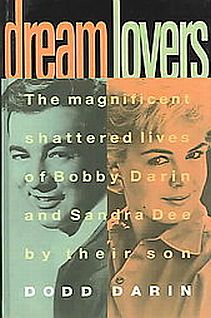
"Dream Lovers," the 1994 book on the lives of Bobby Darin and Sandra Dee, by their by son, Dodd Darin. Click for copy.
During the 1990s, Darin’s music also came into a bit of revival as record companies repackaged some of his hits. In 1992, after a two-CD set, called The Best of Bobby Darin was released, Jay Cocks of Time magazine wrote that Darin’s music was worth revisiting: “Tunes like ‘Clementine’ and ‘Skylark,’ even a chestnut like ‘Bill Bailey’,” he wrote, “can still make your speakers jump.” The new CDs, said Cocks, “prove that his pop singing, had it not been eclipsed by the advent of the Beatles and the passing of Tin Pan Alley, could have become world-class.” Darin, he said, “was born a little out of time…”
Further interest in Darin continued in 1994, with the release of the book Dream Lovers, written by Dodd Darin, the son of Bobby and Sandra Dee. The book was a highly personal account by Dodd of his parents’ lives, their marriage, and his own life growing up in their household. It was not a pretty picture, probing both the insecurities of his father and the anorexia, alcoholism and childhood abuse of his mother. Dodd was described by one reviewer as “an injured bystander on the scene of a broken celebrity marriage.” He was helped on the book by writer Maxine Paetro.
|
Use of His Music Over the years, Bobby Darin’s songs and song-writing have shown up in a wide range of films and television shows, and also various TV ads. “Splish Splash,” appears in the soundtrack for the 1998 movie, You’ve Got Mail and also in an episode of the TV series, Happy Days, among others. “Dream Lover” was used in the 1991 film Hot Shots! starring Charlie Sheen. “Beyond The Sea” has been used in films such as Apollo 13, Goodfellas, Black Rain, A Life Less Ordinary, and the Austin Powers film, Goldmember. It has also been used in television series such as The X-Files and American Dreams. “Beyond the Sea” is also found in one scene of the 1998 HBO miniseries, From the Earth to the Moon. In 2005, it was used in a Carnival Cruise Lines TV ad. Other Darin tunes have also been used in TV ads, such as those for Kodak and Oral B products. In 1989, however, Darin’s estate sued McDonald’s over a burger ad that imitated his “Mack the Knife” song, a case that was eventually settled. |
In Hollywood, meanwhile, there had been long-standing interest dating to the 1980s, in putting Darin’s life on the big screen. But since that time, there had also been considerable legal squabbling among film makers and screenwriters over the making of a Darin film. While the fighting continued, PBS broadcast the well-received documentary, Bobby Darin: Beyond the Song, in December 1998.
Back in Hollywood, actor Kevin Spacey, who had keen interest in Darin’s life, surfaced as the front-runner in making a Darin biographical film. With funding from Lions Gate Films and a German production company, QI Quality International, the film Beyond the Sea was released in 2004.
Spacey — who plays Darin in the film, singing all of Darin’s songs — also produced and directed the film.
Beyond The Sea opened late December 2004 and to wider release in early 2005, but did not do well at the box office, generating about $6 million domestically and another $2 million overseas. It cost an estimated $24 million to make. The DVD version was released in June 2005. Spacey later explained on the DVD commentary that his biggest hope was that the film would reintroduce Bobby Darin’s music to a whole new generation of fans, which it appears to have done, as sales of Darin’s music shot up over 150 percent shortly after the film’s release.
Bobby Darin today has a continuing following and fan base, with several websites devoted to the details of his career. In May 2007, resulting in part from fans’ donations, Darin received a star on the Las Vegas Walk of Stars.
Bobby Darin Legacy
In his short life, Bobby Darin managed to leave a considerable mark on the world of music, and to a lesser extent, that of film as well. At the start of his career, he was, according to some observers, the most musically talented of all the early 1960s’ teen idols. And he was versatile; unbounded by the convention of his day, scoring hit songs in a variety of genres — pop, jazz, folk, and even country & western. He also helped advance the use of music-as-social-statement, contributing to 1960s’ protests with his folk-rock creations. A generous performer by many accounts, Bobby Darin helped others get their start, and sometimes gave them material to use in their careers. In film, he had a modestly successful acting career, appearing in 13 films while contributing songs and scores to a number of others. On the Las Vegas entertainment scene, he had an impact, in his own way, as important as other 1960s’ headliners. Regarded as one of the era’s most gifted nightclub entertainers and jazz vocalists, he was also a talented arranger and interpreter of other artists’ material. Bobby Darin made the most of his time while alive, as he himself once put it: “It’s a one-time shot, this life, and you don’t get any second chances.”
For additional stories at this website on the history of music and artist biography, see the “Annals of Music” page. Thanks for visiting — and if you like what you find here, please make a donation to help support the research and writing at this website. Thank you. — Jack Doyle
|
Please Support Thank You |
___________________________________
Date Posted: 26 May 2008
Last Update: 9 August 2023
Comments to: jackdoyle47@gmail.com
Article Citation:
Jack Doyle, “Dream Lover, 1958-1973,”
PopHistoryDig.com, May 26, 2008.
_____________________________
Bobby Darin Music at Amazon.com…
Sources, Links & Additional Information
“Bobby Darin,” in Holly George-Warren and Patricia Romanowski (eds), The Rolling Stone Encyclopedia of Rock & Roll, Rolling Stone Press, New York, 3rd Edition, 2001, p. 238.
Will Friedwald, “Bio – Bobby Darin,” Capitol Records, July 2004.
David McGee, “Bobby Darin,” The New Rolling Stone Album Guide, Rolling Stone, New York, 2004.
“Bobby Darin,” Wikipedia.org, 2007.
“2,” Arts & Entertainment, Time, Friday, March 10, 1961.
Edward Linn, “Little Singer With a BIG EGO,” The Saturday Evening Post, May 6, 1961.
Don Heckman, “Bobby Darin Back in Song Program,” New York Times, February 27, 1972.
Jay Cocks, “Music: A Bright Star Eclipsed,” Time, Monday, January 27, 1992.
CBS, “Bobby Darin: Brash, But Talented,” November 17, 2004.
Nevada newspaper review of Bobby Darin performance at the Landmark nightclub in Las Vegas, Nevada, June 3, 1970.
Robert Fontenot, “Profile: Bobby Darin,” Your Guide to Oldies Music, About.com, 2007.
Al DiOrio, Borrowed Time: The 37 Years of Bobby Darin, Running Press, 1981.
Dodd Darin with Maxine Paetro, Dream Lovers: The Magnificent Shattered Lives of Bobby Darin and Sandra Dee, Warner Books, Inc., September 1994.
“Beyond The Sea,” Wikipedia.org, 2007.
Jeff Bleiel That’s All: Bobby Darin on Record, Stage and Screen, Tiny Ripple Books; 2nd edition, September 2004.
David Evanier, Roman Candle: The Life of Bobby Darin, Rodale Books, October 2004.
Michael Starr, Bobby Darin: A Life, Taylor Trade Publishing; 1st edition, November 2004.
See also any number of Bobby Darin web sites, including, http://www.bobbydarin.net/main.html
Shane Brown, Bobby Darin: Directions. A Listener’s Guide, 2nd Edition, 2018, Independently Published, 463pp.
_______________________________
…More Bobby Darin at Amazon…


